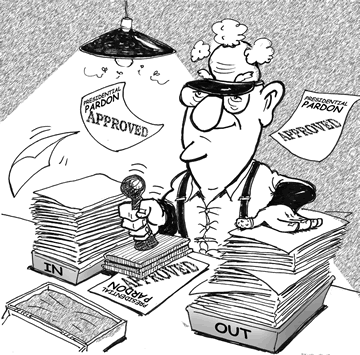
It is a curious matter that, in weeks of media commentary about the Jesmond Mugliett saga, few seem to have picked up on the most glaring flaw in the minister’s defence of his actions.
Some weeks ago, this newspaper editorially observed that the Presidential pardon request, cited as the official reason to retain in employment two officials convicted of bribery, was itself insufficient to justify the decision. The reason is that the pardon, even if granted, would only have commuted a permanent indictment to a temporary one. In other words, the two officials could not be legally retained at the authority, regardless of whether their request for a Presidential pardon was granted or not.
For this reason alone one is tempted to sympathise with ADT chairman Joe Gerada’s claim, written in a letter to The Times, that “the Presidential pardon has no bearing on whether these people should be sacked.”
Indeed it does not; which is why this newspaper stands by its opinion that Dr Gonzi was wrong not to accept Mugliett’s resignation. The Prime Minister is, of course, still in time to rectify this error; but this is highly unlikely, now that the Opposition has thrown its full weight into the fray.
This latter point brings us to another unanswered question. Last Sunday, MaltaToday published a list of Labour MPs who had requested Presidential pardons for their own clients, in a manner indistinguishable from the way Dr Jason Azzopardi handled the above-mentioned case. It was therefore surprising to hear Labour leader Dr Alfred Sant defending his MPs during a radio interview yesterday, claiming that such pardon requests constitute the ordinary “professional work” of any lawyer.
How strange, that the Opposition should so adamantly oppose the government’s handling of a misfired Presidential pardon request made by a Nationalist MP, while at the same time exonerating its own MPs for doing precisely the same thing.
But perhaps the most unfortunate effect of all this confusion – most of which has been deliberately caused for purely political ends – is that it has caused people to question the entire Presidential pardon system to begin with. And yet, it is not the system itself which is at fault: only the abuse of the system, which has been ongoing for decades.
Far from being capricious or arbitrary, Presidential pardons actually play an important (some would say indispensable) role in the judicial process. Theoretically at least, pardons serve two distinct purposes. The first is to act as a legal safeguard against possible miscarriages of justice – as in a hypothetical case where new evidence surfaces only after the wrongly convicted defendant has already exhausted all the possibilities afforded to him by law. In this category too fall all those cases where the law, being blind, may mete out justice correctly but with undue severity given the nature of the case.
Either way, a judicious Presidential pardon may sometimes be the only way to ensure that the innocent are not unjustly imprisoned, or that the guilty are not meted punishment which far exceeds the measure of their crime.
The second purpose is universally recognised as an important element of standard police investigative procedure; as a means of inducing co-operation or eliciting information that would convict criminals who would otherwise be beyond the law’s reach. Here, the unnecessary interference of party politics has played havoc with popular perceptions of this necessary judicial tool: in particular, the notorious case of the attempted assassination of Richard Cachia Caruana, the subsequent presidential pardon granted to Zeppi l-Hafi, and the eventual acquittal of Meinrad Calleja, all of which conspired to strengthen the argument that Presidential pardons are often subject to abuse for political ends.
These considerations only serve to highlight the necessity of a safeguard against abuse of the Presidential pardon system. For instance: the present scenario, whereby defence lawyers routinely apply for pardons on behalf of their clients simply because the law allows them to do so, is clearly not ideal. The present system lends itself to abuse also on account of its apparent lack of transparency. Unlike the law courts, the President of the Republic is not obliged to disclose applications for such pardons, still less to justify his decision to grant/deny them in the first place.
Be that as it may, no amount of abuse would justify the abolition of the system in its entirety. After all, that would be tantamount to throwing out the baby with the bathwater.

